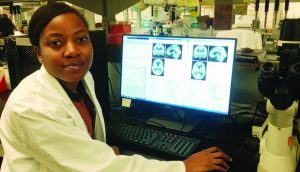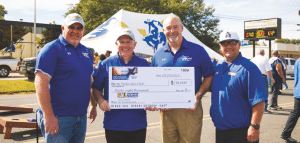 Audrey Katako, a 2012 graduate of Southern Arkansas University, has been researching ways to create a new and advanced method of detecting Alzheimer’s disease and dementia.
Audrey Katako, a 2012 graduate of Southern Arkansas University, has been researching ways to create a new and advanced method of detecting Alzheimer’s disease and dementia.
Katako, a graduate student in the Department of Human Anatomy and Cell Science at the University of Manitoba, said she pushes herself daily in her work because “I have faith in my research and believe it can truly make a difference.”
Katako said she transferred to SAU in August 2011 from Chadron State College in Nebraska. She graduated with a degree in biology and a minor in chemistry and is now in Manitoba as one of two recipients of the 2016-2017 Alzheimer Society of Manitoba’s Graduate Student Fellowship Award.
“My time at SAU was, in one word, remarkable,” she said. “I loved being a student there for a number of reasons: the warm and welcoming campus atmosphere, the tight-knit community feeling of life in a small college town, the fantastic Southern food – I could go on.”
“The highlights of my educational experience took place in the classroom,” Katoka said. “SAU is where I did my first real research. The professors were nothing short of exceptional. While many of my courses were challenging, I enjoyed them. They helped prepare me for the graduate work I am doing now.”
She singled out three professors who encouraged her to continue in her field of study. “I have to extend a special thank-you to Dr. Ganna Lyubartseva and Dr. Tim Schroeder in the chemistry department,” she said. “They were and continue to be incredibly supportive mentors who have encouraged me to succeed since I first took classes with them all these years ago. And Dr. Claude Baker, the coordinator of Alumni Research and professor of biology – he’s wonderful and I loved his classes.”
Born in Zambia, Katako was raised in Botswana, “in a small town reminiscent, in a way, of Magnolia,” she said. “I’ve always loved science and discovery and when I heard about the excellent biology program and the competitive tuition, I knew I had to come here to complete my undergraduate education.”
A desire to learn more about disorders affecting the brain fueled Katako’s journey to Manitoba.
“When I was a student at Chadron State, I took a biology seminar course and one of the assignments was to conduct extensive research into the pathology and pathogenesis of Parkinson’s disease, another neurodegenerative disorder,” she said. “I read research paper after research paper, and I was hooked. I just had to know more about these kinds of disorders.”
Fast-forward to 2012, she said, at SAU, “where I got the chance to work on an independent research project investigating the presence – or lack thereof – of neuromast cells in the head region of Ghologaster cornuta, or swampfish, under the supervision of Dr. Baker. I enjoyed the project so much that I knew before long I wanted to be involved in research.”
Her research focuses on an imaging biomarker for the quantitative diagnosis of prodromal Alzheimer’s disease. Right now, she said, such diagnoses are made in clinical practice through physician readings of positron emission tomography (PET) scans. “The problem is, there are so many variables due to … doctors receiving training at different medical schools and hospitals, and many neurodegenerative diseases produce brain scans with similar patterns. There is a real need for accuracy to be improved through methods that remove subjectivity as far as possible.”
Physicians also need to be able to diagnose Alzheimer’s “early in its onset so that we can develop therapies to treat it before patients have progressed too far for intervention to be helpful.”
Katako said the biomarker she is trying to develop “come make all this possible. I feel a pressure to do because I know there is no cure for this disease.”
Katako works as a volunteer at St. Boniface Hospital in Manitoba. “I absolutely love my volunteer work. There are a large number of patients who have essentially become residents due to their needs. Seeing how much dementia impacts patients and their families spurs me to work harder. Nobody should have to face being perpetually hospitalized and unable to recognize his or her loved ones.”
Katako said she hopes her research propels Alzheimer’s research forward, and that it results in a “diagnostic method that is useful to doctors. I don’t believe research findings should sit on a library shelf collecting dust.”
As to her ties to SAU, Katako said, “I’m still very much in contact with former professors and old friends. It’s great hearing about how the University is growing. Being an SAU alum is a special thing, and I don’t think most of us realize that until we’ve graduated and moved away, and someone asks us, ‘What on earth is a Mulerider?’ I’m proud to represent my alma mater wherever I go.”




